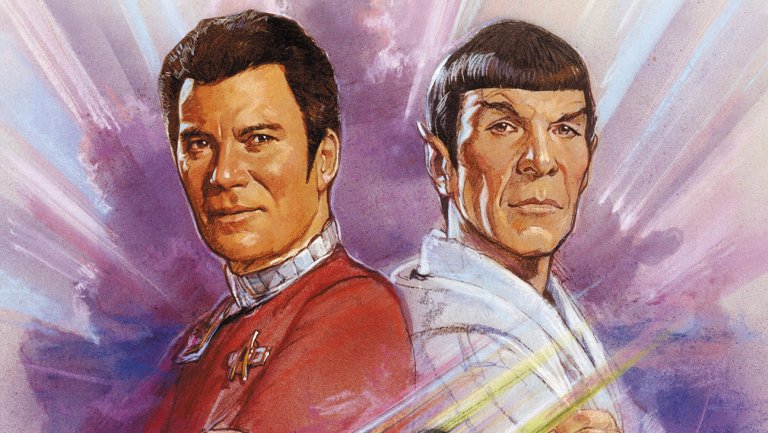chevron_left
-
play_arrow
NGradio So good... like you
‘Star Trek IV’ Writer on Eddie Murphy’s Lost Role and Film’s Rewrite Drama

share
close
The making of the beloved film has become the stuff of legend — and now, in a rare interview, a key figure is shedding light on ‘Voyage Home’ as it turns 30.
Thirty years ago, the crew of the Enterprise went home.
Star Trek IV: The Voyage Home saw Kirk (William Shatner), Spock (Leonard Nimoy) and their shipmates travel back to 1986 on a mission to retrieve two humpback whales and bring them forward in time to the 23rd century to save the Earth from an alien probe.
When the film debuted on Nov. 26, 1986, The Voyage Home became a crossover hit, pleasing Trek fans and general audiences alike. It would stand as the top-grossing Trek film ever until J.J. Abrams’ big budget 2009 film, and it is considered the most charming (and by far, the funniest) Trek movie.
The humorous and environmentally conscious screenplay was written by the young writing partners Steve Meerson and Peter Krikes — who caught the attention of Paramount and the Star Trek brain trust with a script for Fox called The Long Way Home, which had some of the charm and fun the pair would bring to Trek.
“They knew they wanted to make a movie that would make a statement about the environment. They knew that they wanted it to include whales. They had a notion that time travel might enter into it. But it’s basically all they had,” Meerson tells Heat Vision of his and Krikes’ early meetings on the project with director Nimoy, producer Harve Bennett and the rest of the team.
The duo wrote somewhere between seven and ten outlines, with the final one getting approval. It included a role for Eddie Murphy that never would materialized.
“It was always the same story that approved, but the original draft included a part for Eddie Murphy. Eddie was on the lot at Paramount at the time and arguably was the biggest star in the word. They had told us he was a huge Star Trek fan,” says Meerson.
Murphy was going to play an astrophysicist at Berkeley, and the original story did not include Dr. Gillian Taylor (Catherine Hicks), the marine biologist and love interest to Kirk. Eventually the Murphy deal fell through and Gillian Taylor was worked into the script to replace him.
“At the beginning of the process, it was actually a lot of fun. As the process progressed, it became less fun, because it became more political. And I don’t say that with any bitterness. It’s just the way things work in all businesses,” says Meerson. “We began to feel like at a certain point that this was going to be taken away from us, which in fact, it was.”
Over the years, the writing of The Voyage Home has become the stuff of Trek legend. As is common in big franchise films, the script was eventually passed to Trek icon (and Wrath of Khan director) Nicholas Meyer to perform a rewrite, along with producer Harve Bennett.
“Harve Bennett said, ‘We need to Trek this up. You guys have done an amazing job, but we now need to Trek this up,’ ” recalls Meerson.
According to stories tossed around the Internet, the original script was virtually unrecognizable from what was seen on screen once Meyer reworked it. (Meyer recalled it this way on this week’s episode of IGN’s Transporter Room 3 podcast: “I was asked to write Star Trek IV very much at the last minute. They had a script, based on a story by Harve Bennett and Leonard Nimoy. And they didn’t like the script. They threw out the script.”)
Meerson is hesitant to dredge up the past, but says there weren’t significant changes between the original work and what ended up on screen.
“From what I’ve read online and what I know we did, the process of ‘Treking it up’ — I don’t think there were very substantial changes from what we had handed them,” says Meerson. “For us, we just derived a great sense of satisfaction. We always had a lot of pride in our work and this other stuff is kind of irrelevant. It’s just interesting the way things go. It just got very political, and that’s okay.”
The official opening credits say the film has a story by Leonard Nimoy and Harve Bennet, and give Meerson and Krikes top billing for the screenplay, with a second card crediting Bennett and Meyer with the screenplay as well. All of that was determined through an arbitration with the Writers Guild.
“Everybody goes to arbitration if there are more than a few writers on a particular piece — but the rules at that point in time were for a producer to get credit as a writer, they have to write in excess of 60 percent of the script,” says Meerson. “Harve Bennet was a producer. He was coupled with Nick Meyer to try to get around that rule, and at the end of the day, Peter and I got first position screenplay credit, because the guild I believe was hip to the fact that things weren’t exactly Kosher.”
In the intervening years, Meerson and Krikes have quietly been proud of their work on Star Trek, but haven’t taken part in the convention scene.
“We were asked to go to a couple of conventions, probably as recent as 10 years ago. But we never really did, because I have to say we felt a little used and abused. The people who know us know what we did,” says Meerson.
The original Star Trek cast went on to star in two subsequent films — the ill-fated Star Trek V: The Final Frontier, and the much-loved sequel Star Trek VI: The Undiscovered Country (which was directed and co-written by Meyer).
Meerson says he and Krikes’ names were tossed around for potentially coming back for a Trek sequel, but it never materialized.
“There’s always a question of, ‘Do I really want to go back for more here?’ Peter and I did have a few ideas. Oddly, when you do this for a living, people often have similar thoughts. I would say for some subsequent films, those were some of the things we were thinking about doing,” says Meerson. “We weren’t anxious to go back to the well, let’s put it that way. We did the best we could on a film that we’re very proud of.”
Meerson gives kudos to Nimoy for wanting to inject the film with an environmental message at a time when it was not as much in the conversation as it is today.
“We’re all much better as a team. The sum of our parts. That’s to me what was important to this,” says Meerson of the film’s themes. “It shows people what we can all accomplish if we are focused on something together. The noise that surrounds us is not really important, it’s bigger concepts.”
Source: hollywoodreporter.com
Written by: New Generation Radio
Rate it
Similar posts
ΔΗΜΟΦΙΛΗ ΑΡΘΡΑ
COPYRIGHT 2020. NGRADIO




















Post comments (0)